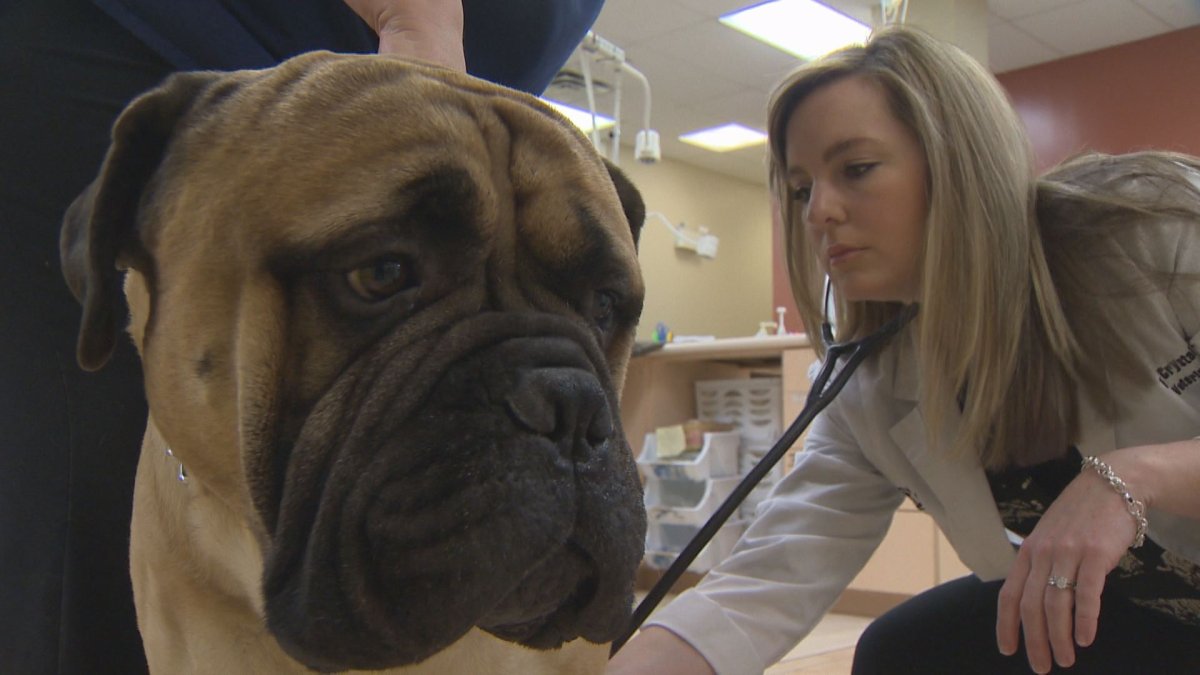Donating blood is commonly associated with humans, but dogs and cats can also do the same for their respective species at a Dartmouth clinic.

“We see a lot of need for blood and blood products here,” said Dr. Crystal Craig, a veterinarian at the Metro Animal Emergency Clinic.
She said the clinic gives pets “light sedation” and then collects the blood.
The blood is for animals needing blood or blood products for things like injuries or a low amount of protein in their blood.
Most donations are collected from pets — with their owners’ permission — already at the clinic while sedated for other treatments and healthy enough to give blood.
“They do get a small discount on their bill and then they also get to be a hero,” Craig said.
Other pets are brought in specifically to donate, often by “employees or relatives of employees who want to help out,” she added.
It takes approximately 15-20 minutes to collect about 450 millilitres of blood.

Get daily National news
Feline donations are also accepted at times, but the greater need is typically for dog blood.
“Cats certainly need to be sedated, even more so than dogs, because of the way they are,” Craig said with a laugh.
Among the requirements for dogs to be able to donate are to be between two to seven years of age, over 55 pounds, vaccinated and having a friendly temperament.
People interested in finding out if their pets are suitable to be put on the list of potential blood donors can call the clinic.
Similar blood donation banks in other Canadian cities can found through the Canadian Animal Blood Bank.
READ MORE: Canadian Animal Blood Bank in need of doggy donors
Cheryl Doucette brought Marshall, her five-year-old bullmastiff, to donate in the afternoon.
Craig’s team sedated the outwardly calm dog, then shaved part of his neck where a jugular catheter was later inserted to collect the blood.
“He’s big, so he can certainly give us what we need and he also is what’s called DEA negative, so he’s a universal donor,” Craig said.
The team took samples of his blood to test.
Doucette said she has brought him in to donate once before after her sister-in-law, a veterinary assistant at the clinic, told her about the program.
“I would be very grateful to have somebody else give that gift to my pets and to myself, so it means a lot for me to be able to do that for somebody else,” she said.
Marshall already gives back in other ways. Doucette said he does “therapy work” by visiting seniors’ homes and universities.
Once the blood was collected, he received IV fluids through a catheter.
Marshall took a few minutes to awaken after that and appeared slightly stupefied but progressively got back to normal.
“I don’t think he knows much what’s going on here right now other than then the fact he’s really tired,” Doucette said.
She left the clinic with a gifted squeaky ball, a certificate recognizing the donation and a branded bandana across Marshall’s neck reading, “I saved someone’s best friend!”
- Ottawa apologizes, announces $45M compensation for Nunavik Inuit dog slaughter
- Canada’s defence spending timeline ‘an eternity’ for U.S., senator warns
- Canada Post says no ‘major breakthrough’ in talks as strike enters 2nd week
- Nova Scotia Tories appear safe with Liberals, NDP battling for second: polls











Comments